
Resumen Jornadas de Jóvenes 2025
Así fueron las Jornadas de Jóvenes 2025, celebradas del 6 al 9 de marzo. Un finde único en el que pudimos conectar, convivir, aprender y compartir experiencias entre iguales en un privilegiado y bello entorno.
Tuvimos la oportunidad de disfrutar de talleres verdaderamente enriquecedores. Durante el Encuentro del Grupo Joven GETECCU – ACCU se generó un interesante debate en torno a las necesidades de las personas con EII y las perspectivas de futuro. Nos acompañaron Margalida Calafat e Iria Bastón
De la mano de Lourdes Pérez Restoy (@infosexologica) aprendimos sobre red flags en Prevención de la violencia de género. Un interactivo encuentro donde pusimos en común las diferentes perspectivas y cómo reaccionar ante estas situaciones.
También contamos con Mara Jiménez (@croquetamente__). Un taller sobre autoestima y cuerpos diversos muy emocionante en el que pudimos conectar con nosotros/as mismos/as y explorar nuestra honestidad y amor propio.
Para cerrar el evento con un toque especial, un precioso manto blanco de nieve cubrió Cercedilla.
Gracias a todos y todas por hacerlo posible. ¡Nos vamos con el corazón lleno de aprendizajes, energía positiva y buenos recuerdos!
¿Nos vemos el año que viene?

Pedaleando hacia la educación: alianza por la inclusión escolar
Esta alianza nos permite acortar distancias, mejorar la asistencia escolar y brindar nuevas oportunidades a estudiantes que enfrentan largas caminatas o dificultades de transporte para acceder a la educación. Una bicicleta puede marcar la diferencia entre abandonar o continuar la escuela.
Una alianza que transforma realidades
Project Bike Love (PBL) es una organización sin fines de lucro fundada en 2015 en California, Estados Unidos. Nacida del amor por el ciclismo y la solidaridad, su misión es clara: entregar bicicletas a quienes más las necesitan, con especial énfasis en mujeres y niñas.
Está liderada por mujeres comprometidas como Erin Machan, psicóloga deportiva y ciclista, y Belén Ramírez, médica humanitaria paraguaya. Ambas creen firmemente que la bicicleta es mucho más que un medio de transporte: es una herramienta de equidad, libertad y acceso a derechos fundamentales.
Saladillo pedalea hacia un futuro mejor
Este año, llegamos con Project Bike Love hasta la escuela Saladillo, en la ciudad de Villa Hayes, donde hicimos entrega de bicicletas a cinco estudiantes cuyas familias enfrentan trayectos extensos para que sus hijos e hijas puedan estudiar.
Uno de los beneficiarios compartió con emoción:
«Ahora voy a llegar a la escuela más rápido y ya no voy a estar tan cansado».
Otra niña expresó que recibir su bicicleta fue:
«Un sueño cumplido».
Estas historias reflejan el impacto real y cotidiano de una acción concreta, que mejora la asistencia escolar, fortalece la autonomía de niñas, niños y adolescentes, y alivia la carga económica y logística que muchas veces recae sobre las familias.
Más que bicicletas: compromiso y comunidad
Las entregas de bicicletas se realizan con un enfoque participativo, valorando criterios como:
- Asistencia regular a clases.
- Compromiso y acompañamiento de las familias.
Necesidad real de transporte escolar.
Cada bicicleta entregada representa una oportunidad de cambio, continuidad educativa y crecimiento personal.
En Fundación Alda seguimos comprometidos con eliminar barreras que limitan el acceso a la educación, trabajando junto a aliados como Project Bike Love para que más estudiantes puedan pedalear hacia sus sueños.
Agradecemos profundamente a PBL por su confianza y por seguir pedaleando con nosotros hacia un futuro más justo, inclusivo y lleno de oportunidades.
La entrada Pedaleando hacia la educación: alianza por la inclusión escolar se publicó primero en Fundacion Alda.

¡Celebramos la XXXIII Convención Anual de ACCU España!
¡Vuelve la Convención! ¡Te estamos esperando!
Este año celebramos la XXXIII Convención Anual de ACCU España en Oropesa del Mar (Castellón) del 05 al 08 de junio. En el marco de la Convención, celebraremos también el IV Congreso y los II Premios ACCU.
Participa en esta inolvidable jornada llena de actividades, talleres, formación, fortalecimiento asociativo, acompañamiento entre iguales, ¡y más! Un espacio de aprendizaje e intercambio de vivencias y experiencias.
En las imágenes adjuntas puedes consultar el programa definitivo.
¿Te vienes?
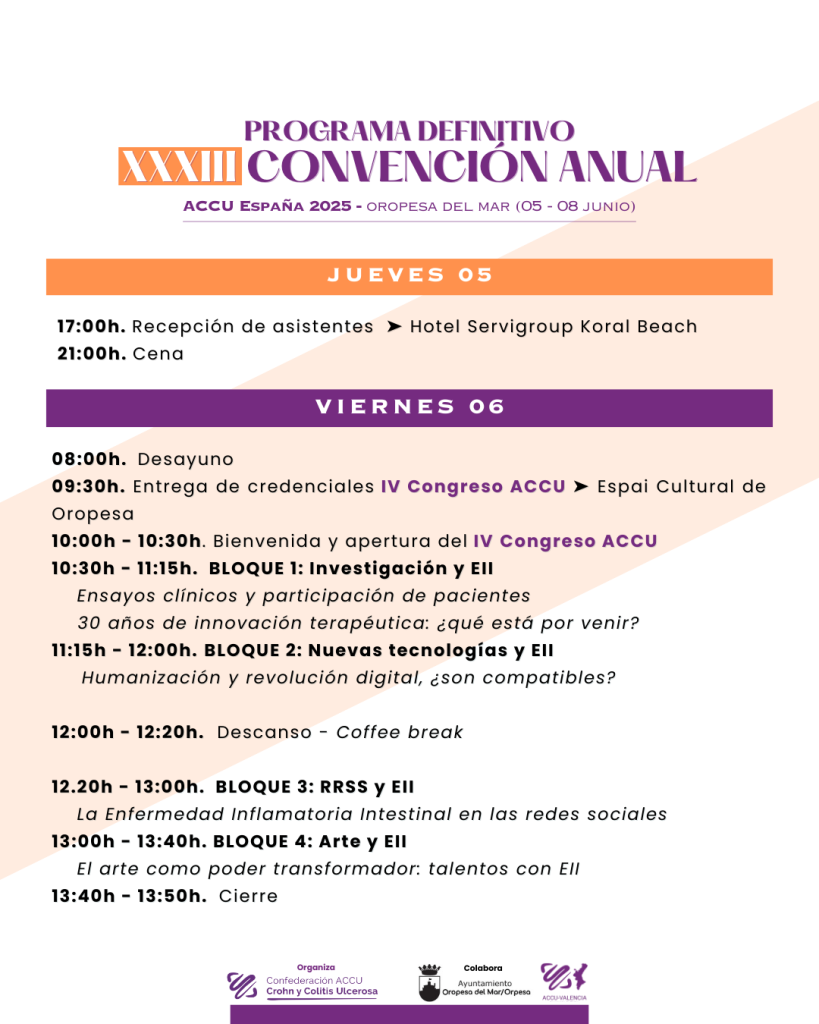
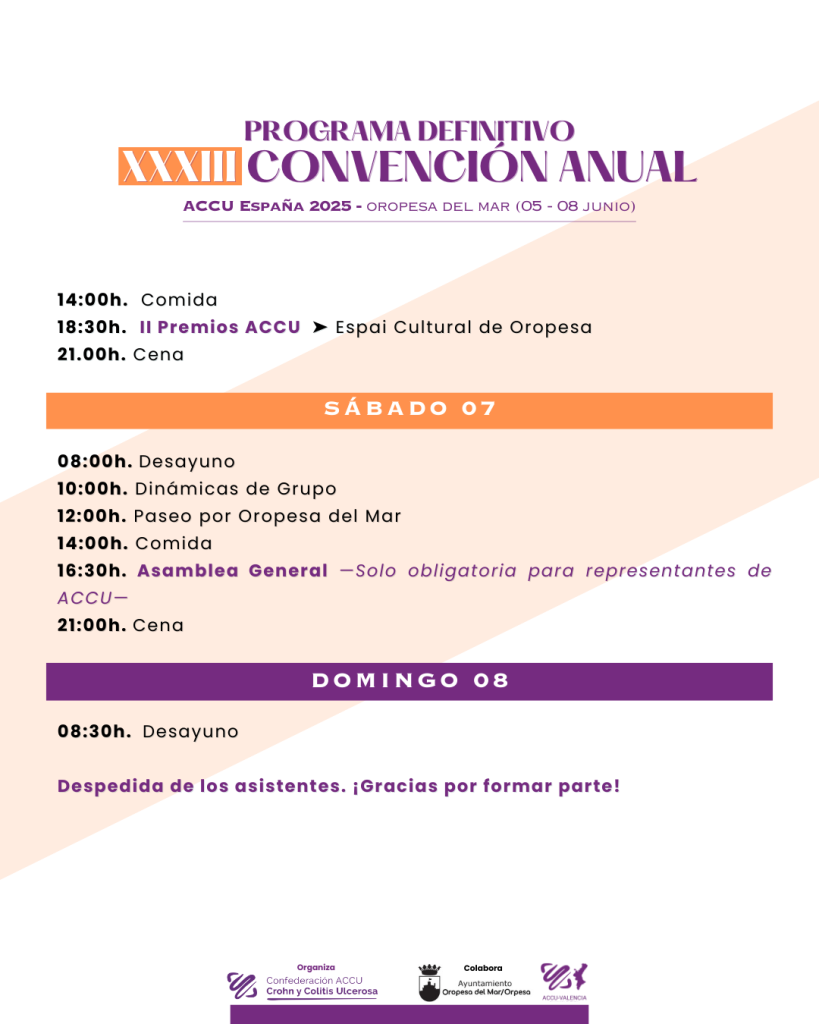

Una «financiación justa»
Una «financiación justa» para las entidades que sostienen los cuidados y la Dependencia en Cádiz La Federación Provincial de Asociaciones de Personas con Discapacidad Intelectual, Autismo y Parálisis Cerebral de Cádiz atiende a más de 2.000 gaditanos «La discapacidad no es una cuestión de caridad, sino de derechos», dice María Luisa Escribano, la presidenta […]

Ensuring Accountability and Action: Side Event at the 58th Human Rights Council Highlights Urgent Need to End Violence Against Children
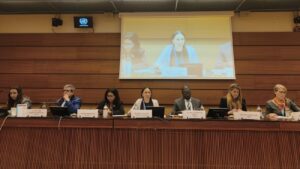
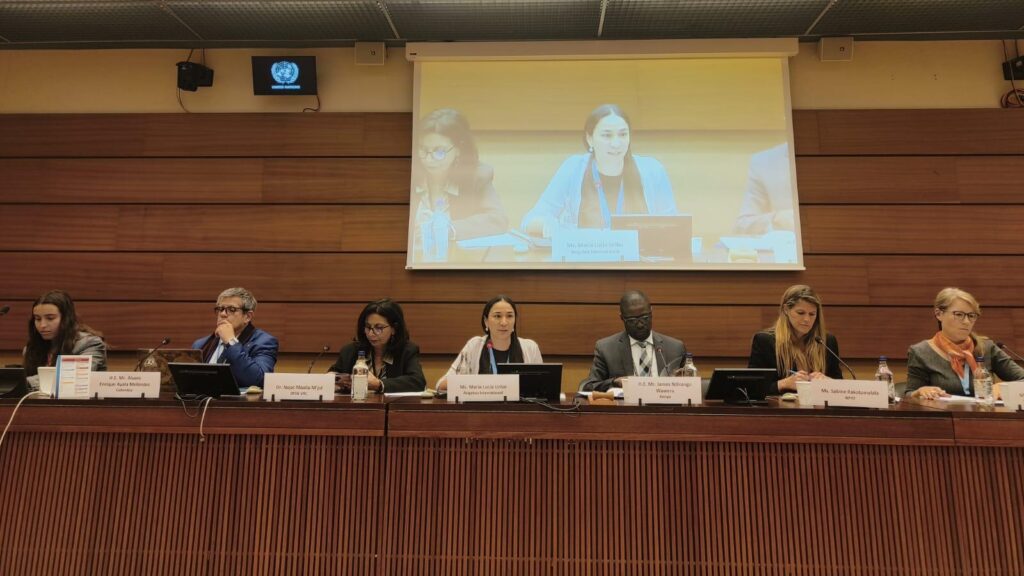
Geneva, 13 March 2025 – A high-level side event at the 58th session of the Human Rights Council brought together around 140 participants, both online and in person, including representatives from 24 Permanent Missions to the UN in Geneva. Organized by the Child Rights Connect Working Group on Children and Violence, in collaboration with Arigatou International, Lumos, Plan International, Terre des Hommes, the United Nations Office on Violence against Children, the World Health Organization (WHO), and World Vision International, the event reinforced the urgent need for sustained accountability and action to end violence against children. The event was co-sponsored by the Permanent Missions of Kenya, Colombia, and Canada to the United Nations in Geneva.
The discussion was built on the momentum generated by the Global Ministerial Conference in Bogotá (2024), where over 120 governments pledged to end violence against children. Panelists stressed the need to translate these commitments into real, measurable change.
Ms. Maria Lucia Uribe, Executive Director of Arigatou International – Geneva, moderated the panel and set the tone for the discussion, referencing a powerful message delivered by children at the Annual Day on the Rights of the Child: “We have heard from you, but sometimes what you promise is change, and the promises don’t get fulfilled.” She emphasized the need for collaboration between states, organizations, and civil society to hold governments accountable.
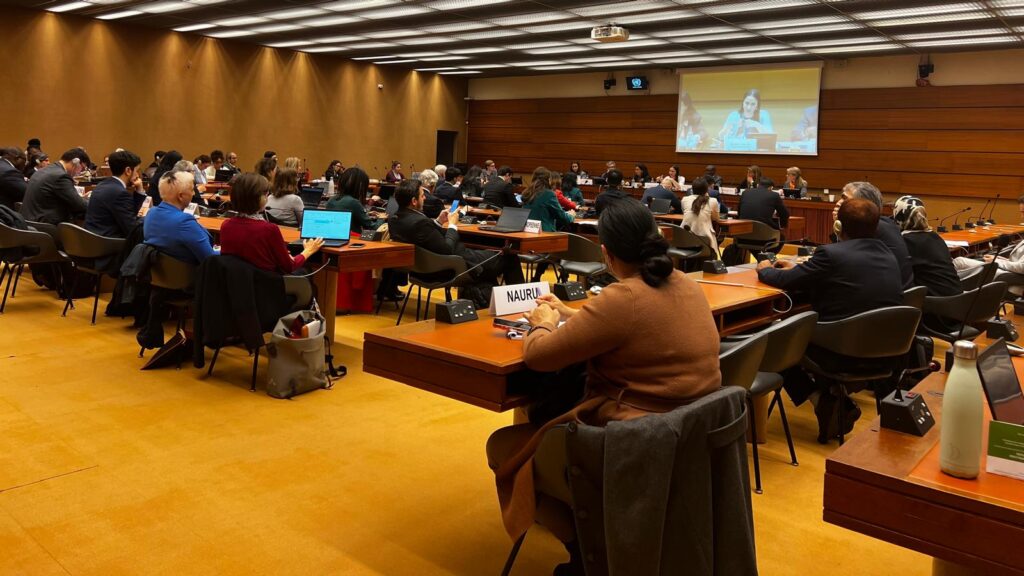
International human rights mechanisms are instrumental in ensuring accountability, but panelists stressed that true progress requires cooperation across sectors. H.E. Ambassador Álvaro Ayala, Deputy Permanent Representative of the Republic of Colombia, highlighted this by recalling his country’s legislative progress, stating: “Colombia has taken a decisive step toward breaking the harmful cycle of violence. In 2021, law 2089 was enacted explicitly to prohibit the use of corporal punishment, the elimination of degrading treatment, and any form of violence as a method of correction or against children or adolescents.”
A powerful moment in the event was the participation of six children from Colombia, Ecuador, Kenya, and Nepal, actively involved in Ending Violence Against Children (EVAC) initiatives. They shared their perspectives through video messages, highlighting the urgent need for governments and institutions to uphold their commitments. Their voices added depth to the discussion, reinforcing that children must not only be heard but also meaningfully involved in decision-making processes. Jaskiran from Kenya spoke about the importance of tackling cyberbullying and digital safety, calling for “immediate responses to cyberbullying cases so that delays don’t perpetuate violence.” Similarly, Chetan and Sahadip from Nepal called for meaningful youth participation: “Governments should organize meetings where children and young people can share their ideas and help plan actions to meet international commitments. Our voices matter in saving the future.”
Dr. Najat Maalla M’jid, Special Representative of the UN Secretary-General on Violence Against Children, stressed: “We need to translate [commitments] into action quickly (…) and we need to make sure that we have children on board.” Echoing this, H.E. Ambassador James Ndirangu Waweru, Deputy Permanent Representative of the Republic of Kenya, pointed out the cultural shift needed to protect children: “Corporal punishment was once normal. Today, if you attempt it in Kenya, you will find yourself as a guest of the state—not in the State House, but in prison, because punishment has been prohibited.”
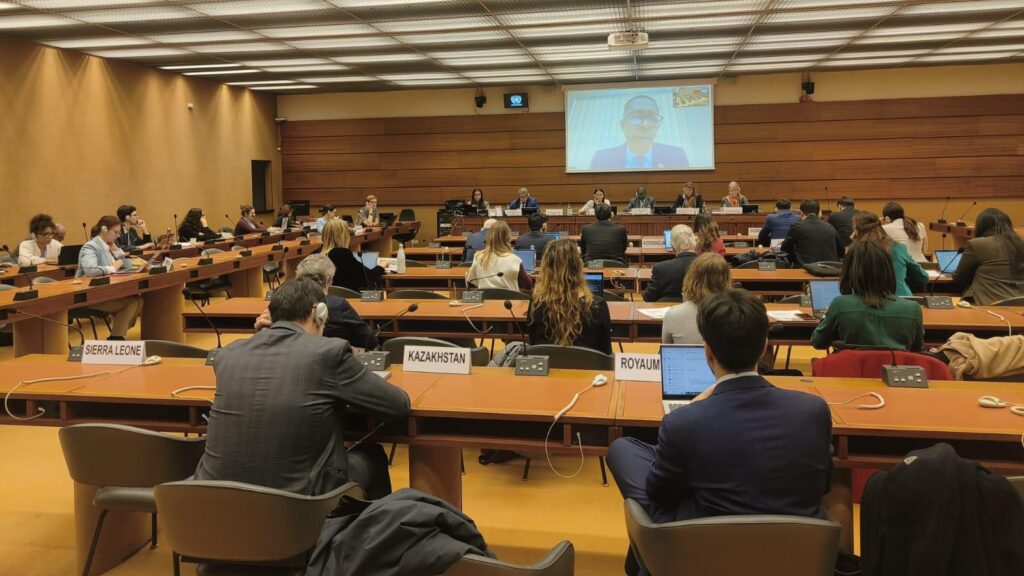
Concrete steps toward accountability were outlined. Professor Benyam Dawit Mesmur, Member of the UN Committee on the Rights of the Child, highlighted the need for focus on both emerging issues like cyberbullying and longstanding threats such as corporal punishment. Meanwhile, Ms. Sabine Rakotomalala, Senior Technical Officer at WHO, announced a digital dashboard to track country commitments, a one-stop platform to monitor pledges, policies, and progress—ensuring transparency and accountability at every step.
The event ended with a call to turn words into action. Ms. Anne-Marie Vuignier, UN Representative for Geneva at World Vision International, stressed: “Pledges without action are just words.” The discussion underscored that ending violence against children is not just a long-term goal—it is an immediate necessity. Moving forward, participants called for stronger political will, financial investment, and sustained collaboration to protect every child, everywhere. Final statements were made by representatives from Canada and Mexico, reaffirming their countries’ commitments and progress to ending violence against children, including cross-sector efforts on positive parenting and violence-free schools.
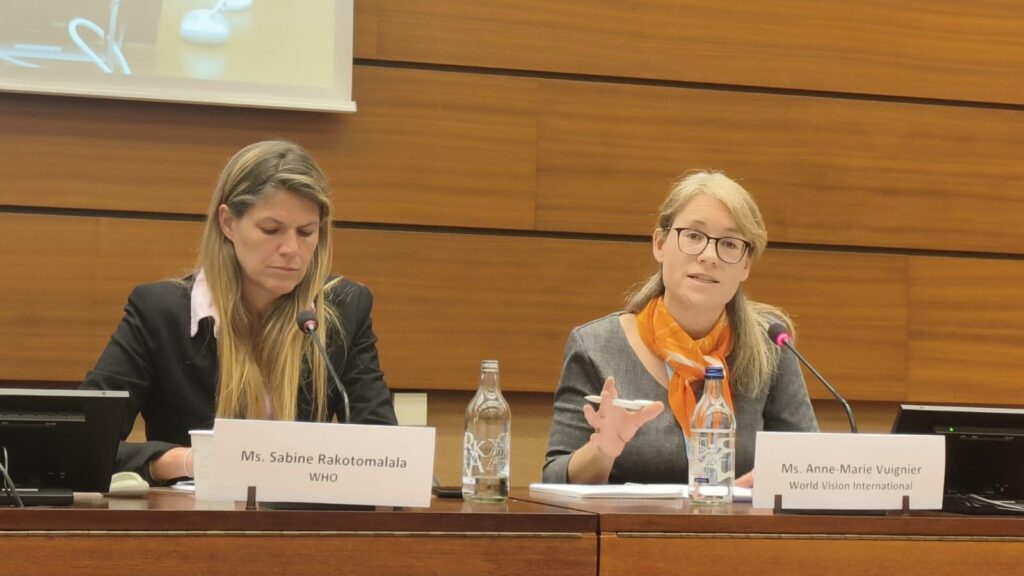
The post Ensuring Accountability and Action: Side Event at the 58th Human Rights Council Highlights Urgent Need to End Violence Against Children appeared first on Ethics Education for Children.






